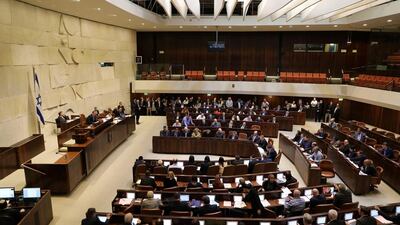JERUSALEM // Rights organisations in Israel on Tuesday readied for a court battle against a new law that legalises seizure of Palestinian private property amid a wave of international criticism over the unprecedented measure.
The Arab minority rights NGO Adalah, the liberal Peace Now movement and the Association for Civil Rights in Israel were among those preparing petitions to the supreme court in hopes it will strike down the Settlement Regulation Bill passed by the Knesset in a 60-52 vote late on Monday.
“We think that legally it’s a clear case,” said Adalah lawyer Suhad Bishara.
“We’re still hoping the court will declare the law illegal and unconstitutional, with no validation in the West Bank because it violates international humanitarian law, the legal framework the military governor should be bound to.”
“The supreme court has issued decisions in the past that say the occupation authorities cannot violate property rights for political purposes,” Ms Bishara said.
UN Secretary-General Antonio Guterres on Tuesday said the bill violated international law.
“This bill is in contravention of international law and will have far reaching legal consequences for Israel,” Mr Guterres said.
Palestinian president Mahmoud Abbas called the law an “attack against our people”, and said it was illegal and “obviously against the wishes of the international community”.
Britain, France, Turkey were among the nations that condemned the Israeli move, with French foreign minister Jean-Marc Ayrault saying the law “could exacerbate regional tensions”. Turkey’s foreign ministry said it violated last month’s UN Security Council Resolution 2234 which declared all forms of settlement to be illegal.
Adalah’s petition will represent 13 or 14 Palestinian local councils in the West Bank upon whose lands settlements have been constructed, said Mati Milstein, a spokesman from the NGO. The petition will include aerial photographs of 16 settlements overlaid with the borders of the Palestinian local government areas upon whose lands they are constructed.
In a landmark 1979 case, the supreme court deemed it illegal to build settlements on what is clearly private Palestinian property, limiting seizures only for purported military necessity or to what Israel claims to be “state land”.
Israeli officials have used a variety of legal devices over the years to lay claim to Palestinian private property, including a law stipulating that agricultural land left fallow reverts to the state so that settlement housing can be built on it.
Now, the new law enables blatant seizure of Palestinian private property without the need to resort to the legal sleight of hand of reclassifying it as “state land”.
Unless overturned, the law, billed by its supporters as a major step towards annexation of the West Bank, effectively nullifies the supreme court’s 1979 decision, opening even more swathes of Palestinian land to Israeli settlement and retroactively legalising many thousands of houses built on private property in hundreds of places.
Israeli attorney general Avichai Mendelblit has said he would refuse to defend the law against challenges and defence minister Avigdor Lieberman said last month that the law had a one hundred per cent chance of being struck down by the supreme court.
But Israel’s hard right government is trying to muster pressure on the court, with culture minister Miriam Regev calling for its powers to be diluted if it strikes down the law and advocating for all out annexation of the West Bank if the court rules against the government.
“The time has come to tell the supreme court you are not the decision-makers, we are,” she said.
Senior Palestinian official Saeb Erekat said the bill was “putting the last nail in the coffin of the two-state solution”.
“All Israeli settlements in occupied Palestine are illegal and a war crime regardless of any law passed by the Israeli parliament or any decision taken by any Israeli judge,” he said.
“The international community has the responsibility to take concrete measures to protect the Palestinian people under Israel’s military rule rather than just issuing statements.”
The Gaza-based Palestinian Centre for Human Rights similarly called for “immediate and effective” action from the international community “to restore confidence in the rule of law and put an end to the prolonged Israeli challenge and denial of the international laws and to the inherent impunity enjoyed by Israel for decades”.
Both rights groups and commentators warned of the damage to the prospects of peace if the law was not overturned.
Peace Now said the legislation was "another step towards annexation and away from the two-state solution", while the Palestinian Jordan Times columnist Daoud Kuttab said it buried the idea of an exchange of land for peace upon which diplomatic efforts to solve the conflict so far have been based.
“The last fifty years we had the premise there is a concept of land for peace. Clearly now there is no concept of land for peace,” he said.
“The question is what Israel wants with the Palestinians. Will they be under apartheid, with no political rights forever?”
foreign.desk@thenational.ae
* With additional reporting by Agence France-Presse and Associated Press

